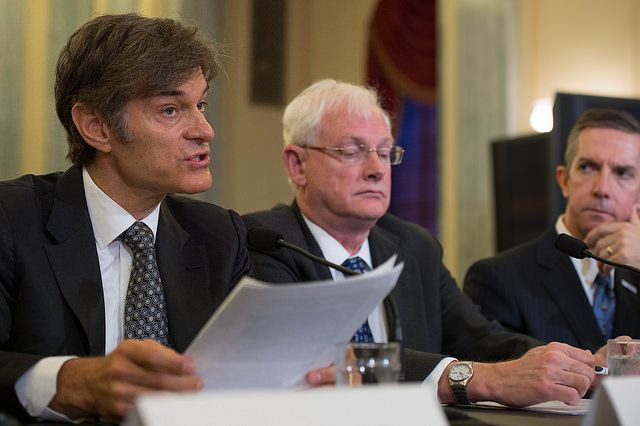Dr. Oz Defends Weight Loss Advice After Senate Accuses Him Of Backing Diets Scams To Help Boost Sales

In Hollywood, when a celebrity gets caught in a scandal, there are two options: Sincerely apologize and donate to a well-known charity or defend your innocence and hope that you are believed. Dr. Mehmet Oz has taken the second route, defending his promotions of bogus “miracle” weight-loss supplements in a hearing in Washington on Tuesday. The Senate made it clear that they thought the doctor was as phony as his obesity cures.
Giving False Hope
During an investigation on false advertising of diet supplements, the Senate alleged that Dr. Oz promoted questionable products in an effort to help boost sales. Oz, once hailed by Oprah as “America’s doctor,” was accused of "fueling the diet industry with unscientific claims” by Sen. Claire McCaskill, chairwoman of the Senate’s Consumer Protection Panel, Reuters reported. "When you call a product a miracle, and it's something you can buy, and it's something that gives people false hope, I just don't understand why you need to go there,” McCaskill told Oz, according to Reuters. Oz has denied all claims that he gave his viewers false hope, and insisted that he does in fact “personally believe in the items" he promotes on his show, “The Dr. Oz Show.”
No Science To Back It Up
The Senate has cited that many of Oz’s “magic weight-loss cures” and “the No. 1 miracle in a bottle” supplements have little scientific truth behind them, USA Today reported. For example, after Oz promoted Pure Green Coffee Beans, the manufacturer sold nearly half a million bottles of pills. Later on, the Federal Trade Commission filed a lawsuit against the company for false advertising. It was only after this that Oz retracted his support for the product, CBS News reported. The coffee bean pills are not the only products Oz has backed that later faced lawsuits by the FTC. Raspberry ketone supplements, which were featured on another segment of the Dr. Oz show, also faced similar FTC charges. "I've got no problem with celebrity endorsements of any product but I do have a problem when a science-based doctor says something is a miracle when there's no science to back it up," McCaskill told CBS News. According to the senator and other lawmakers present at the hearing, the Dr. Oz Show has become a driving force for dietary supplement scams, encouraging scam artists to “pop up overnight,” USA Today reported.
Oz Claim’s He’s A Victim Too
In Oz’s opinion he is just another victim of big corporations that use his quotes, or images of him, out of context for their advertising. “I recognize that oftentimes they don’t have the scientific muster to present as fact. I would give my audience the advice I give my family all the time, and I have given my family these products,” Oz stated in his defense, according to Reuters. This is the opposite of Michael Spector’s 2013 profile of Oz in the The New Yorker, which said that the doctor eats like a “Paleolithic hunter-gatherer,” exercises daily, and definitely doesn't follow any of the miracle cures or fads he regularly promotes.
Diets Scams Are A Serious Problem
The Senate voiced their hopes that Oz would use his popularity to help crack down on diet drug scams rather than “be a part of the problem.” According to a 2011 FTC consumer fraud survey, there are more victims of phony weight-loss products than any other type of fraud that was part of the survey. Last year, Americans were estimated to have spent $2.4 billion on weight-loss services, and this figure is predicted to rise to $2.7 billion by 2018, explained Mary Koelbel Engle, an FTC official.



























